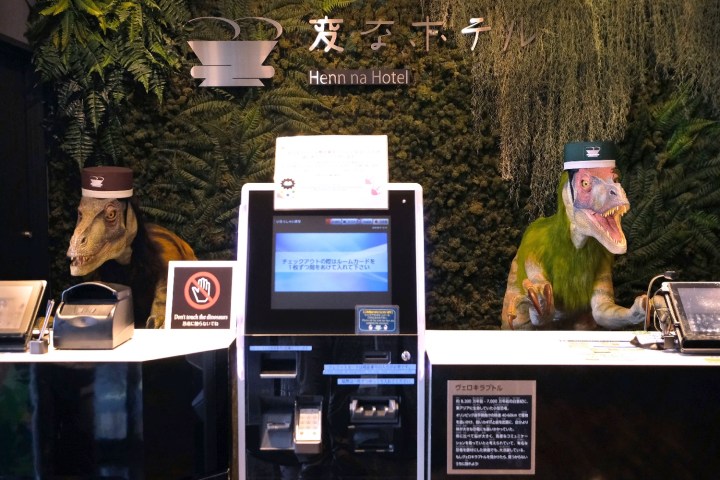
There are plenty of concerns about robots stealing jobs from decent, hard-working, flesh-and-blood humans. However, to paraphrase an often-misquoted Mark Twain line, reports of our impending redundancy may have been greatly exaggerated. At least, that is our takeaway from a Wall Street Journal report claiming that Japan’s oddball Henn na “Strange” Hotel has fired half of its 243 robot staff.
The reason? Because these labor-saving machines were causing more problems than they were solving — and requiring humans to come in and fix things as a result.
One of the victims of the robot layoffs was a doll-shaped robot called Churi, which functioned as an artificial intelligence assistant like an embodied versions of Amazon’s Alexa. Unfortunately, Churi turned out to be remarkably poor at answering questions from hotel guests. A pair of velociraptor dinosaur robots, which worked at the hotel check-in, were also made extinct by the firings since they wound up being unable to do many of the jobs required of a receptionist. A concierge robot, meanwhile, was replaced by a human better able to answer important questions about nearby tourist attractions. Humans are also now going to carrying luggage to the rooms, of which the previous robots were only able to reach around one-quarter of — and only in optimal weather conditions.
The problem with Henn na Hotel getting rid of its robots is that it’s a bit like Disney getting rid of the staff dressed as mice: It’s pretty much the whole concept. As the hotel’s website notes, “Henn na Hotel is the world-first hotel staffed by robots. At the front desk, you will be greeted by multi-lingual robots that will help you check in or check out. At the cloakroom, the robotic arm will store your luggage for you. Mechanic [sic] yet somehow human, those fun moments with the robots will warm your heart.” The idea, in essence, was to build the most efficient hotel in the world.
In the end, though, it seems that — as great as robots can be — they’re simply not suitable for every role just yet. With the rise of robot bartenders, robot-staffed restaurants and the like, it will be interesting to see how many similar concepts fall apart in the coming years. After all, once the novelty of a robot dinosaur on reception wears off, you’re just faced with a receptionist who can’t properly understand you and lacks a sufficient number of fingers on each hand to properly photocopy your passport.
Editors' Recommendations
- So THAT’S why Boston Dynamics retired its Atlas robot
- Amazon’s new humanoid robot will not take human jobs, company insists
- Telepresence classroom robots trialed for absent students
- Amazon’s Scout robot appears to have made its last delivery
- Amazon reveals the science behind Astro, its new home robot


